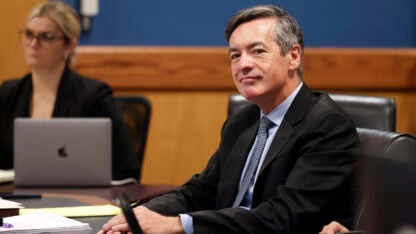Races at the top of the ballot in Georgia have garnered much attention, including the neck-and-neck race for president and two tight Senate elections. But among the other names on the ballot are the contests for Public Service Commission.
The commissioners, who run in statewide elections for six-year terms, regulate utilities in Georgia. During their Atlanta Press Club debates on Tuesday, several themes emerged: providing help to families in need during the pandemic, the cost of electricity and the growth of Georgia’s solar industry.
Though it’s a somewhat obscure agency, the commission has an important role in people’s everyday lives, including setting Georgia Power customers’ electric bill rates and overseeing the costs of major capital projects, including the expansion of Plant Vogtle in Waynesboro, that also show up on Georgia Power customers’ bills.
The nuclear expansion at Plant Vogtle, the only nuclear power plant under construction in the country, is over budget and behind schedule. It’s typically a key point of disagreement. But in Tuesday’s debates, it was a side issue, with more focus on how the commission and Georgia Power have responded to the pandemic.
In the District 1 debate, Republican Commissioner Jason Shaw, the incumbent and a former state representative, explained the commission’s decision to lift a moratorium on power shutoffs.
Shaw had introduced the motion to put the moratorium in place in the early weeks of the pandemic. The commission approved ending it this summer.
“We have the tough balance of making sure we protect those that are vulnerable, that are most affected by this pandemic, but we also have a duty to protect all the ratepayers,” Shaw said. “And we can’t go to the federal government for a handout on this.”
Libertarian District 1 candidate Elizabeth Melton pushed back on another commission move during the pandemic: allowing Georgia Power to eventually ask for its customers to cover coronavirus-related costs, such as cleaning supplies and protective equipment.
“We’re all struggling now. Businesses are hurting,” she said.
Democratic District 1 candidate Robert Bryant said if he’s elected, his focus would be on data and partnerships.
“The balance should always tip on the side of the public,” he said.
Expanding Clean Energy
During the District 4 debate, incumbent Republican Commissioner Lauren “Bubba” McDonald, also a former state representative, cited his record on expanding renewable energy in Georgia.
“We are decommissioning coal plants,” he said. “We have developed the solar program. We buy wind from Oklahoma and New Mexico.”
Daniel Blackman, the Democratic candidate for the seat, said he’d like to see more collaborative efforts among the commissioners, the state legislature, Georgia Power and unions. And he said he’d like to see Georgia Power put forward a more ambitious plan.
“We need to look at ultimately being able to transition into a clean energy future, but that’s going to take a lot of planning,” he said.
In his closing remarks, Libertarian candidate Nathan Wilson also emphasized a push for more renewables and energy storage as a way to keep energy bills low.
“When you have the hot summers, those bills go up,” he said. “We need to look at ways to offset those costs by having more solar, more renewable energy during those peak times.”
Campaign Finance
Leading up to the election, a group of advocates including the Georgia Ethics Watchdog and Georgia Conservation Voters have released a report on the commissioners’ campaign finance disclosures to outline the percentage of donations coming from people tied to the industries that the commission regulates.
About 80% of Commissioner McDonald’s donations came from industry, according to the project, and about half of Commissioner Shaw’s.
It is not legal for utilities to donate to commissioners’ campaigns, but it is for individual employees of those utilities to contribute.
“I thought for sure that we would see more low dollar contributions to their campaigns, and we just don’t,” said William Perry, executive director of Georgia Ethics Watchdogs.
“And I think the sole reason is not because people don’t care but because these commissioners aren’t trying, because it’s easier to sit back and wait for checks from people who work at Georgia Power than it is to go out and get support from the average Georgian.”
Shaw did not respond to a request for comment. In an interview, McDonald took issue with the characterization that he is controlled in any way by the industries he regulates.
“As far as the influence of minor contributions, it’s no more than my neighbor giving me a contribution, or people in my church, or people that know me, it’s all within the framework of the laws,” he said.
“I’m not an expert in every area of the world and when they bring advice I listen. I listen to both the negatives of those and the positives of those and at some point in time I make a decision.”








